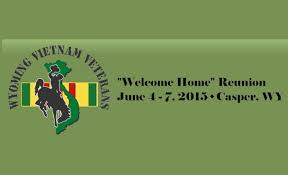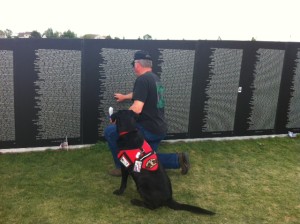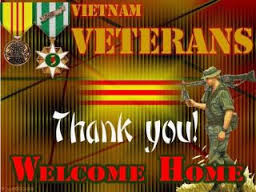Jun
30
NOT YET HOME
Filed Under American Patriotism, Bless Our Troops, Tears of a Warrior, Vietnam Veterans, Welcome Home, Wounded Warriors | Comments Off on NOT YET HOME
by Janet J. Seahorn, Ph.D
A few weekends back we attended the first reunion of Wyoming Vietnam Veterans in recognition of the fifty-year anniversary of the beginning of the Vietnam War. For many it was the first time they had ever been thanked or honored for their service. As with most gatherings, there were parades, activities and several inspiring guest speakers. One of the speakers, a DSC and Silver Star recipient, Lee Alley of Wheatland, Wyoming spoke of his experience. Yet the message that resonated with me was when he noted that so many of our veterans are “Not Yet Home”. The way he could tell was simply by looking into their eyes which still held the gaze of combat.
There have been numerous articles, books, and blogs, including ours, that refer to this condition. Merely returning home from war does not mean that the individual has forgotten all that went on during his/her time in war. Although too many civilians (and even some veterans who have never experienced combat) seem to infer that coming home means being home. What few people fully understand, including some combat veterans, is the heart and body carry the burden of war. The mind continues to hold the traumatic events and the cells of the body alert the person to any sight, sound, taste, touch, or smell that even remotely relates to the dangers faced on the battlefield. The feelings of peace and security do not yet necessarily exist just because one is back home. Memories refuse to fade and may become even more vivid. The heartache and horror of war remain raw within mind, heart, body, and soul.
Not Yet Home is the albatross around many veterans’ souls. Forgetting is not an option. Trying to reintegrate into a “normal” world takes an immense amount of energy, and it is a goal that even those who have been home for over forty-plus years have not yet achieved. Living with the images, pain may be the new “normal”. What is hopeful for those suffering with Post Traumatic Stress is that with patience, support and practice a person can still live a productive, joyful life. Perhaps, Not Yet Home is the best one can achieve.
And that may be good enough.
Mar
18
How you can honor our Vietnam vets
Filed Under Combat PTSD, Peace, PTSD, Tears of a Warrior, Troops, Veterans, Vietnam Veterans, War | Comments Off on How you can honor our Vietnam vets
Ann McFeatters: How you can honor our Vietnam vets
Guest Post from the Dallas Morning News:
By ANN MCFEATTERS
Published: 05 March 2015 07:27 PM
The man who said his name was Danny arrived at my door with a huge floral box. Inside was one of the most beautiful bouquets I’d ever seen.
Danny was with the Maryland highway department, supervising a crew installing new curbs on my street. He was also a Vietnam veteran who had seen the small blue star in my window, indicating two family members were serving in Iraq and Afghanistan.
Danny came from a generation that provided 9.2 million people who served in the military during the Vietnam era, many of whom came home from war reviled, not thanked for what they gave their country. Like most of his fellow veterans, Danny vowed to show only gratitude to those in military service, no matter what the politics of any current war that service members are called on to fight. Flowers to a stranger were to thank my family.
This month marks the 50th anniversary of the arrival of 3,500 Marines in Da Nang, South Vietnam, beginning 10 years of a terrible conflict that would sear and scar this nation.
In the “lessons learned” department, perhaps the most important is to separate the warrior from the war. Today Americans of all political stripes express sincere appreciation for what the men and women of the armed forces are called on to do for their country, whether the mission is popular or not.
The Vietnam Veterans Memorial on the mall in the nation’s capital, with its awesome wall designed by Maya Lin, engraved with the names of 58,300 people who gave their lives in the jungles of Southeast Asia, was meant as one way toward healing a divided, bitter country.
It has worked. The three-acre memorial with its gardens, wall, Vietnam Women’s Memorial and The Three Servicemen statue, is visited by 4.5 million people a year. Its website, with photos and information on veterans and messages from their friends and families, draws 4 million virtual visitors annually.
The veteran behind the memorial, Jan Scruggs, a man of enormous personality and drive who raised the $8 million needed to begin implementation of it, is retiring this year.
One way the Vietnam Veterans Memorial Fund plans to honor him and all the war’s veterans is to raise money for a $116 million underground education center to display some of the 400,000 personal items left at the wall by visitors, a unique occurrence which stunned the memorial’s founders.
From teddy bears to tear-stained letters, the items, stored in boxes maintained by the National Park Service, which owns the memorial, tell powerful stories.
Approved by Congress with no funding, the education center needs donations from the public if it is to be ready for a ribbon-cutting ceremony in 2020. Most of all, the Vietnam Veterans Memorial Fund wants future generations to learn about the Vietnam era, how decisions were made and what they meant to the nation.
Tomorrow’s fifth-graders must learn they owe a debt to those who came before them and that they, too, must leave a legacy of service, the best way they are able. Technology will give them access to such things as digital oral histories from veterans and TV footage of the first war played out in the nation’s living rooms.
There are 7 million living Vietnam War veterans. Beyond those who died or went missing there, Vietnam veterans are still dying of injuries sustained in the war, such as exposure to Agent Orange and post-traumatic stress disorder. The fund’s CEO, Jim Knotts, a Desert Storm veteran, stresses that these veterans must be honored, and that good health care for all veterans must be a national priority.
Because of space restrictions, the education center will be the last major memorial built on the National Mall. Fifty years after the start of the Vietnam War, it is time to take the next step in honoring those who fought it, whether they wanted to or not.
Here’s to you, Danny, and all those like you.
May
29
NOT FORGOTTEN
Filed Under Healing, Memorial Day, Tears of a Warrior, Veterans Plaza, Vietnam Veterans, War, Wounded Warriors | Comments Off on NOT FORGOTTEN
by Janet J. Seahorn, Ph.D
It has been a really long Memorial Day Week and we are truly exhausted.
For the last six days we have been privileged to be a part of bringing the large version (80%) Traveling Vietnam Wall to Fort Collins,Colorado. The city of Fort Collins put in its request back in 2003 to host this special event over Memorial Day Weekend. With extensive planning throughout the last six months, the Veterans Plaza Committee of Northern Colorado wondered how many people might visit the Wall and pay homage to all who made the ultimate sacrifice in service to their country.
Our answer came and all were humbled.
Thousands came daily. They came to pay their respects. They came to pray. And some came to simply heal a bit more. Seeing the names of classmates and friends lost in battle is sad indeed, but viewing the names of fallen comrades with whom you served is far more profound.
I watched as young children were educated about how all those names got on the structure. One small child innocently asked, “You mean they are all dead?” For this tiny boy it was hard to comprehend such a large number. For those who served it was even harder to comprehend and accept once again the huge price of war.
The Vietnam Wall is more than a memorial. It is a reminder to our nation of what we did wrong in welcoming our young men and women back after serving overseas. That lesson, I believe has been learned. However, there is so much further we need to grow. As our military returns from war, as a nation we need to make sure that they are comforted, healed, and given work that will allow them to have a solid future. And we need to make sure we are more aware of those veterans and families who have endured a great deal in the name of freedom. They are the silent minority and too many are finding it gut-wrenching hard to reintegrate back into their communities.
After observing the thousands of individuals who visited the Traveling Vietnam Wall these last many days, I truly believe we, as a community/nation, have the will to accomplish this task of human restoration.
What is hard, is taking the time during our very busy days to notice what needs to be done and then do it. Each small step we take moves all of us closer to a healthier and more humane nation.
God does truly bless America when we take the time to meet the needs of others.
Dec
16
UNSEEN WOUNDS
Filed Under Black Lions, Combat PTSD, PTSD, Tears of a Warrior, Veterans, Vietnam Veterans, War, Wounded Warriors | Comments Off on UNSEEN WOUNDS
Guest Blog:
by Jim Fountaine, Vietnam Veteran
A man of eighteen years, barely dry behind the ears hears Uncle Sam’s call and in eight short weeks the change is as radical as a caterpillar into a Butterfly. Only this change has no beauty to it. A young boy is transformed into a soldier, an instrument of war.
The days of taking his girl to Lover’s Leap, skipping class to go fishing are gone. He is thrust into a world of violence against his fellow man. He begins to see the ravages of war. He learns to kill, not for sport or for food, but for territory, ideals. He does learn these skills with dedication and without question because he is doing what he is ordered to do!
Then, suddenly, he is thrust in a world of pain, death, blood and pure fear. He sees things that no amount of education or training has prepared him for. His friends are now few and close, yet distant because getting too close will cause pain when that friend is no longer there. The cold, damp, heat, loneliness become his constant companion. Sometimes he tries to deaden the pain with booze. He fights himself to bury what he sees. He keeps doing his job without emotion because he feels if he feels he’ll go nuts.
Then suddenly it’s all over and he sheds his uniform and finds himself back on main street U.S.A. When he sees his old school mates he finds he no longer has anything in common with them. He cannot talk about his experiences because they won’t understand. He finds he has had his youth robbed from him. He no longer trusts those around him with the ease he once did.
He has wounds you cannot see; not wounds of the body but wounds of the soul, the mind and the spirit, and no one can see them. No one can see the scars. He drifts back into a time when he felt the pain for real. He seeks out answers he cannot find. At times he feels out of control, so tries to find things he believes that will give him control like booze, drugs or he buries himself in work almost to the point of exhaustion.
He withdraws from relationships for fear of loss. He rejects authority for that authority brought him harm in the past. He feels alone in a vast world that doesn’t seem to care. He hurts, but no one can see the wounds; no one hears his cries for help. He is judged by people by what they see on the surface. They don’t see the Unseen Wounds in him. They don’t hear his silent cries and all he can do is ask, “Why can’t you see what this is doing to me?”
Jan
10
THE MAN I DIDN’T KNOW
Filed Under Combat PTSD, Family, PTSD, Tears of a Warrior, The Man I Didn't Know, Veterans, Vietnam Veterans, War | Comments Off on THE MAN I DIDN’T KNOW
by Janet J. Seahorn, Ph.D
This is the title of a book sent to us by Marie Leduc, the wife of a Vietnam Veteran who co-wrote it with retired naval aviator, Art Schmitt, Ph.D. Later Art got his degree in psychology. The Man I Didn’t Know: The Stories of Wives and Families of Vietnam Veterans who suffer from “Post Traumatic Stress Disorder”, is a collection of stories and poems written from the perspective of those most directly impacted by combat.
The articles are heartrending and the poetry will literally place you in the hearts and souls of the writers. While reading through the many tales I found several statements pretty sobering and thought provoking. Some statements gave me an unusual viewpoint of war, especially the last few wars we have fought and left without a clear victory. I have included several small snippets of some of these in this blog.
- “The United States did not lose the war in Vietnam, the South Vietnamese did. The last American troops left Vietnam on March 29, 1973, (however, the last flight out wasn’t until 1975). We did not lose the war… we stopped fighting” (p. 16). Recently, December 15, 2011 we raised the last American flag as we leftIraq. I wondered if years down the road we will describe this last conflict in a similar manner.
- “There are two kinds of PTSD… acute, which is treatable, and Chronic, which is manageable”. More Vietnam veterans, per capita, suffer from chronic PTSD than from any other war. The reasons for this is unknown, but it may be that it was an unpopular war and the veterans were not welcomed home” (p. 16).
- In another article, To Answer Your Question, by Ed Ruminski, the veteran is trying to explain to his son what combat was like, how time stopped and actions were both quick and in slow motion. How he had to be “constantly watching, listening to my senses”. In the end he merely states, “They call it war, and to answer your question son, yes, I have killed somebody. What I was unaware of was how by that process I just described, I was also killing myself” (p.19). Sadly, many of our Iraq and Afghanistan troops are returning with parallel sentiments.
 These are just a few statements from the book. The various writings describe the wounds of the minds, how scary it can be for a family to negotiate the many behaviors and emotional ups and downs of their beloved warrior, how a mother must learn to cope with the death of her son while visiting the Vietnam Wall to stay connected, and how PTSD affects children when their under developed minds and bodies leave them vulnerable to actions which they may never fully understand. In the end, this last quote by Jacqueline McVicar (p. 85) really says it all.
These are just a few statements from the book. The various writings describe the wounds of the minds, how scary it can be for a family to negotiate the many behaviors and emotional ups and downs of their beloved warrior, how a mother must learn to cope with the death of her son while visiting the Vietnam Wall to stay connected, and how PTSD affects children when their under developed minds and bodies leave them vulnerable to actions which they may never fully understand. In the end, this last quote by Jacqueline McVicar (p. 85) really says it all.
“His fight was in Vietnam,
Ours is the Vietnam in him.”
Ordering information: ISBN: 1-4196-2452-0 www.booksurge.com 1-866-308-6235














